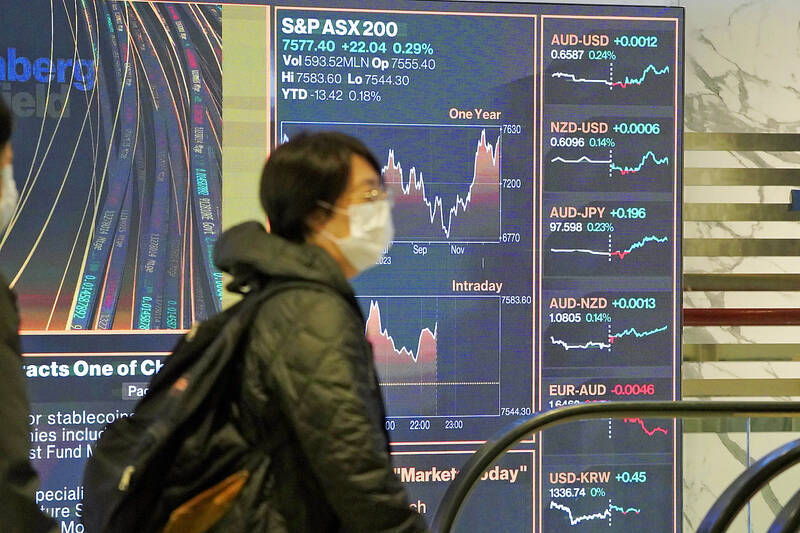The consumer confidence index this month rose 2.08 points to a 22-month high of 72.14, with all six components gaining value, as rallies in the local bourse helped boost overall confidence, a National Central University survey found yesterday.
The confidence measure moved up for the fourth straight month, aided mainly by a 5.54 point
elevation in stock investment to a four-year high of 58.68, said Dachrahn Wu (吳大任), director of the university’s Research Center for Taiwan Economic Development, which conducted the survey.

Photo: CNA
“The overall confidence reading has recouped to the level before the Russia-Ukraine War in February 2022, while the investment sentiment returning to the pre-pandemic era,” Wu said, adding that the TAIEX is benefiting from capital inflows seeking to take advantage of a tech cycle recovery.
The sentiment uptick also had to do with the prevalent expectation that Taiwan’s economy would come out of the woods following several quarters of technology inventory adjustments that have weighed on exports and private investment, he said.
The TAIEX had a poor beginning this month, but staged a turnaround after Taiwan Semiconductor
Manufacturing Co (TSMC, 台積電), the world’s largest chipmaker, delivered stronger-than-expected fourth-quarter earnings and forecast an up to 25 percent increase in revenue for this year, Wu said.
Expectations that the US Federal Reserve would cut interest rates later this year help to bolster shares in emerging markets, he said.
The TAIEX rallies not only create a positive wealth effect, but also fuel optimism about the economy and job market, he said.
Taiwan’s exports are generally expected to resume the role of growth driver this year after taking a hit from sharp global inflation and interest rate hikes, Wu said, adding that the service sector would continue to enjoy robust business.
That explained why the gauge on jobhunting in the coming six months grew 1.92 points to a 2.5-year high of 69.24, while the measures on household income and economic outlook rose 1.85 points and 1.61 points each to a 1.6-year peak of 78.5 and 82.94 respectively, the survey said.
The wealth effect and a stable job market bode well for people’s willingness to purchase durable goods, as the component edged up 0.15 points to 112.08 points, it said.
Confidence scores of 100 or higher indicate optimism and values lower than neutral suggest pessimism, it said.
Furthermore, the sub-index on consumer price movements in the next six months printed 31.37, a mild increase of 1.41 points from one month earlier, indicating that the public is less concerned about inflationary pressures, Wu said.
The university said it arrived at the observations after interviewing 2,984 adults by telephone between Jan. 18 and 21.

Semiconductor business between Taiwan and the US is a “win-win” model for both sides given the high level of complementarity, the government said yesterday responding to tariff threats from US President Donald Trump. Home to the world’s largest contract chipmaker, Taiwan Semiconductor Manufacturing Co (TSMC, 台積電), Taiwan is a key link in the global technology supply chain for companies such as Apple Inc and Nvidia Corp. Trump said on Monday he plans to impose tariffs on imported chips, pharmaceuticals and steel in an effort to get the producers to make them in the US. “Taiwan and the US semiconductor and other technology industries

SMALL AND EFFICIENT: The Chinese AI app’s initial success has spurred worries in the US that its tech giants’ massive AI spending needs re-evaluation, a market strategist said Chinese artificial intelligence (AI) start-up DeepSeek’s (深度求索) eponymous AI assistant rocketed to the top of Apple Inc’s iPhone download charts, stirring doubts in Silicon Valley about the strength of the US’ technological dominance. The app’s underlying AI model is widely seen as competitive with OpenAI and Meta Platforms Inc’s latest. Its claim that it cost much less to train and develop triggered share moves across Asia’s supply chain. Chinese tech firms linked to DeepSeek, such as Iflytek Co (科大訊飛), surged yesterday, while chipmaking tool makers like Advantest Corp slumped on the potential threat to demand for Nvidia Corp’s AI accelerators. US stock

The US Federal Reserve is expected to announce a pause in rate cuts on Wednesday, as policymakers look to continue tackling inflation under close and vocal scrutiny from US President Donald Trump. The Fed cut its key lending rate by a full percentage point in the final four months of last year and indicated it would move more cautiously going forward amid an uptick in inflation away from its long-term target of 2 percent. “I think they will do nothing, and I think they should do nothing,” Federal Reserve Bank of St Louis former president Jim Bullard said. “I think the

SUBSIDIES: The nominee for commerce secretary indicated the Trump administration wants to put its stamp on the plan, but not unravel it entirely US President Donald Trump’s pick to lead the agency in charge of a US$52 billion semiconductor subsidy program declined to give it unqualified support, raising questions about the disbursement of funds to companies like Intel Corp and Taiwan Semiconductor Manufacturing Co (台積電). “I can’t say that I can honor something I haven’t read,” Howard Lutnick, Trump’s nominee for commerce secretary, said of the binding CHIPS and Science Act awards in a confirmation hearing on Wednesday. “To the extent monies have been disbursed, I would commit to rigorously enforcing documents that have been signed by those companies to make sure we get